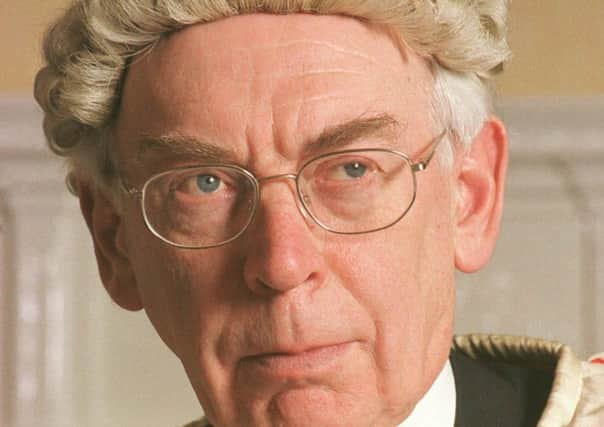Obituary: Lord Coulsfield, PC. Senior judge at Lockerbie trial


John Cameron, Lord Coulsfield, was an eminent member of the Court of Session and an outstanding member of the Scottish legal profession. He had a distinguished career on the bench and because of his profound knowledge of the law he was chosen to be one of three judges to sit in Holland on the controversial trial at Kamp van Zeist of Abdelbaset Ali Mohmed al-Megrahi. For the 84 gruelling days Coulsfield sat with his two colleagues, Lords Sutherland and MacLean with Lord Abernethy as associate judge, listening to the complex and involved evidence that became a historic case of epic proportions. The case made a strong impact throughout Scotland and, indeed, throughout the world. Coulsfield was involved in the minutiae of the case and ensured the court concentrated on the facts and the propriety of the evidence. He fully realised the importance of the case for both the Scottish judiciary and for the 270 people on the plane and the inhabitants of Lockerbie who were killed on that horrendous night just before Christmas in 1988.
Coulsfield was a man of absolute integrity with a powerful mind. He is remembered by court officials – one recalled him as “a pleasant gentleman, considerate and polite” – as a judge of much courtesy with an understated sense of humour. He always showed patience and understanding to even the most nervous witness.
Advertisement
Hide AdAdvertisement
Hide AdJohn Taylor Cameron was the son of the director of education in Dundee; he was a scholar at Fettes College and then read law at Corpus Christi College, Oxford and Edinburgh University. He was admitted to the Faculty of Advocates in 1960 and also lectured in public law at Edinburgh University. He was appointed a Queen’s Counsel in 1973 and served as an Advocate Depute from 1977 to 1979. Prior to his being appointed a Senator of the College of Justice in 1987, Cousfield was a judge in the Courts of Appeal of Jersey and Guernsey.
Coulsfield distinguished himself in many criminal and civil cases but it was the Lockerbie trial for which he shall be remembered. Libya made three stipulations when agreeing to hand over the two accused: that they would not be interviewed by the police; no-one else in Libya would be sought for the bombing and the trial should be before three Scottish judges sitting without a jury. It was a celebrated trial and signs to the camp were posted to SCIN (Scottish Court in the Netherlands) and the area was designated as Scottish land. Despite its complexities, the trial was fair and conducted with a scrupulous balance – the defence being given every opportunity to present their case. In fact the defence listed 121 witnesses but only called three. The fact that Megrahi chose not to be cross-examined meant that certain points could not be comprehensively explored.
Over the years the verdict has become a much-debated subject – akin to the deaths of President Kennedy and Princess Diana – and many contentious aspects of the case are still aired. But the decision to free one Libyan and sentence Megrahi to life imprisonment was widely considered correct. The judges concluded that the “conception, planning and execution of the plot which led to the planting of the explosive device was of Libyan origin”. Megrahi was imprisoned in Scotland but only served nine years – he was released on compassionate grounds in 2009 and survived until 2012. Controversy bedevilled this legal saga even after an appeal unanimously upheld the judgment.
Lord Abernethy spoke to The Scotsman yesterday and recalled his colleague with much affection. “I had known John for many years – we were both Faculty officers in the 1980s before the Lockerbie trial. He was always delightful company with a wry sense of humour. He wore his learning lightly and was known, affectionately, throughout the Scottish legal profession as ‘the Scholarly Lord Coulsfield’.
“John was a man of much distinction in the profession. I followed him as a justice of appeal following his retirement from the bench in Botswana.
“There his judgments and command of the law are fondly remembered. John was an authority on Burns and is remembered throughout the Scottish community in Botswana for once getting up and reciting the whole of Tam O’Shanter at a Burns Supper without a prompt.”
As chair of a working group he devised the procedural reforms that resulted in reparation actions in the Court of Session following a set timetable, His proposals were later adapted in the sheriff and summary cause courts.
Coulsfield, who retired in 2002, married Bridget Sloan in 1964 who survives him. Both were keen hill walkers on the hills near their farm in Perthshire.